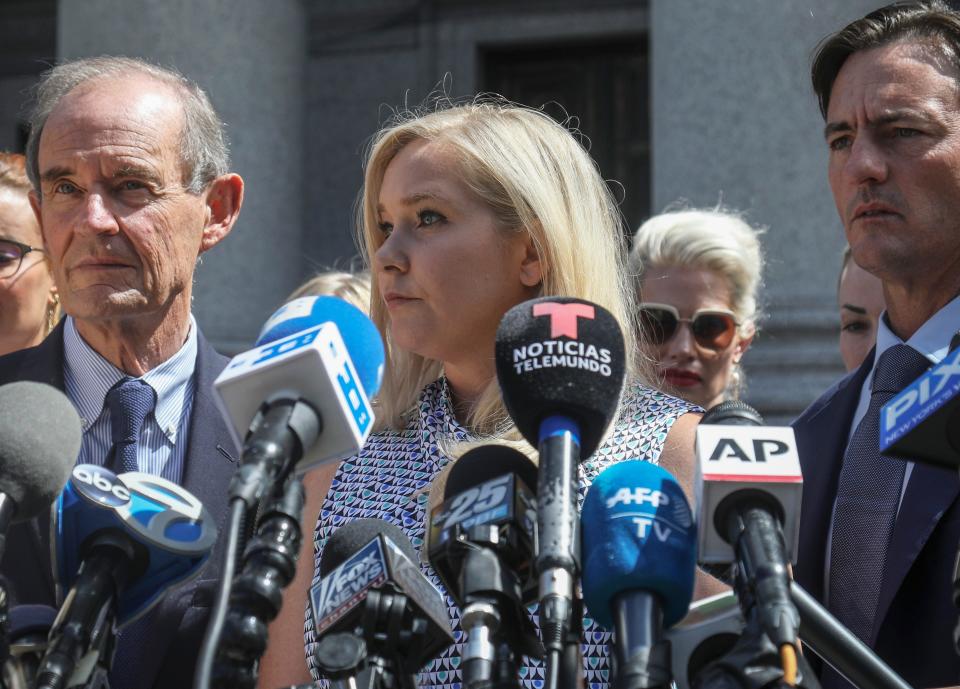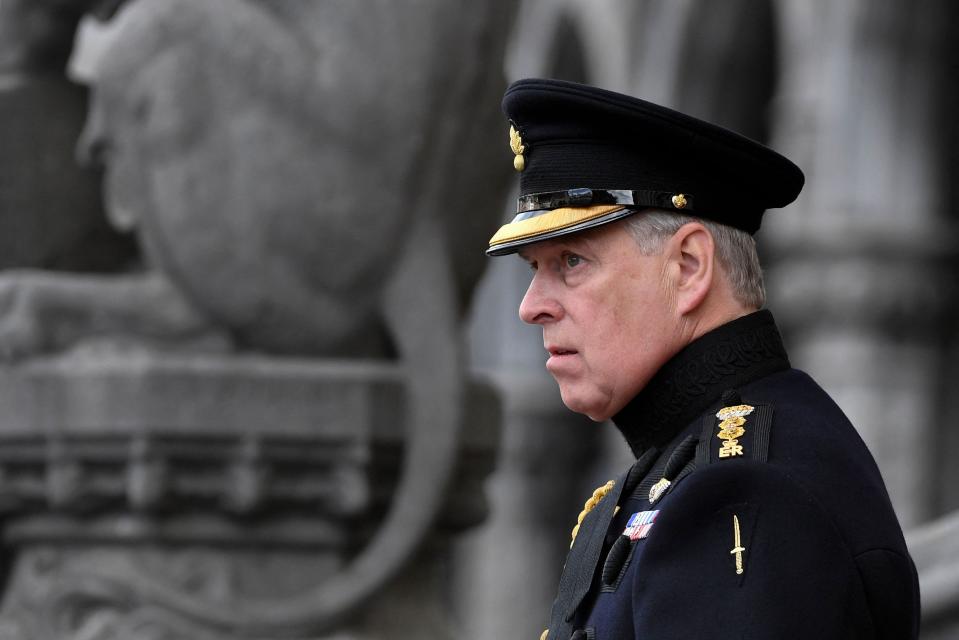Prince Andrew judge seems skeptical that secret settlement invalidates sexual-abuse lawsuit
A crucial hearing in Prince Andrew's attempt to rid himself of a federal sexual-abuse lawsuit concluded Tuesday with no ruling by the judge, whose sharp questioning of the lawyers on the precise meaning of wording such as "other potential defendants" left a strong impression of skepticism about the prince's arguments.
"I appreciate the arguments and the passions, I will have a decision pretty soon but I won't define that further," U.S. District Judge Lewis Kaplan said at the end of the hour-long telephone hearing. "Stay healthy, everyone."
The Duke of York, 61, Queen Elizabeth II's second son, is being sued by Virginia Roberts Giuffre, 38, an accuser of convicted sex-offender Jeffrey Epstein. She alleges Andrew raped and sexually assaulted her, claiming that Epstein, who killed himself while awaiting trial, trafficked her to the prince in New York in 2001 when she was 17 and that the prince knew it at the time.
The prince has vehemently denied Giuffre's accusations since she began making them publicly in January 2015. Andrew's legal team has argued the claims are false and that her lawsuit is aimed at achieving "another payday at his expense."
Kaplan scheduled the hearing for Andrew's American lawyers, led by Andrew Brettler of Los Angeles, to present their arguments for dismissing the case, and to hear Giuffre's lawyers, led by New York celebrity lawyer David Boies, argue for keeping the lawsuit alive.
Prince Andrew lawsuit: Accuser’s settlement with Jeffrey Epstein unsealed, her lawyer says it's 'irrelevant'

Assuming the case goes to trial, Kaplan has scheduled it for the last quarter of 2022, depending on the pandemic.
The discussion during the hearing, occasionally interrupted by Kaplan's pointed questions to Brettler, quickly landed on the 2009 settlement between Epstein and Giuffre, in which she accepted $500,000 and agreed she wouldn't sue him or any "other potential defendants” in the future. Epstein and Giuffre also agreed to keep the settlement secret until it was unsealed Monday in connection with the lawsuit against Andrew.
But what is the meaning of "other potential defendants" and how does that apply to Andrew, Kaplan prodded Brettler, leading to a back-and-forth about legal definitions, contract law and case law and what Giuffre and Epstein may have intended. If the agreement was meant to be secret, how could "other potential defendants" even know about it, Kaplan asked.
Boies for his part argued that the phrase doesn't apply to Andrew and offers him no protection from Giuffre's lawsuit. He said Andrew was not a target of the 2009 lawsuit because he was not suspected of federal sex-trafficking violations, as Epstein was.
"There is no allegation that Prince Andrew was the person transporting anyone; he was somebody to whom the girls were trafficked," Boies said. "It's a different criteria so he is not a 'potential defendant.' "
The task of Andrew's legal team was to explain why the settlement did not name Andrew if it was meant to include him or any other high-profile man Giuffre has accused.
"Epstein is not here to say," Kaplan noted, referring to the former financier's suicide in jail in 2019. "There is a real question about what did she and Epstein have in mind in referring to 'others.' "
Brettler argued that the phrase should be interpreted as applying to Andrew because Giuffre, in her lawsuit against Epstein, claimed he required her to be "sexually exploited" by his friends, including "royalty." He said she could have sued Andrew and others in 2009 and she did not, and thus waived those rights in the agreement.
Virginia Roberts Giuffre's civil suit: Prince Andrew could face U.S. trial next fall for sexual assault suit, judge rules

"She made allegations against royalty, academics, businessmen to whom she was allegedly trafficked." Brettler said. "It would have been easy to leave out 'other potential defendants,' why include that if they didn’t want to include a broad definition of people?"
Kaplan said there could be more than one interpretation of the language. "It would have been easy to say it if they wanted to release 'anyone involved in any sexual activities,' " he said.
Kaplan also expressed doubts about whether the lawsuit should be dismissed because of duplication in Giuffre's claims, and whether New York state's extension of the Child Victims Act because of COVID-19 was unconstitutional. Giuffre cited the look-back law in her lawsuit, filed days before the law expired last August.

Boies sounded occasionally flummoxed by Kaplan's questions during a discussion about the meaning of the terms "first," "second" and "third" parties, how those meanings apply in the agreement, and whether Andrew could use it to protect himself.
"The terms of the settlement preclude its use by a third party, which is Prince Andrew," Boies said. "It can't be used in any court proceeding except to enforce the terms of the settlement agreement, and (that means) only Epstein and Giuffre can enforce it."
The Tuesday hearing comes in the wake of last week's conviction of Epstein's former girlfriend, Ghislaine Maxwell, also a longtime friend of Andrew's, who was found guilty of five of six federal counts, including sex trafficking and conspiracy, after a month-long trial in Manhattan.
Technically, Maxwell's criminal conviction would play no role in a civil lawsuit and it did not come up at the hearing. But it was not good news for Andrew's case and further damaged his already-tattered standing in the United Kingdom, where he has been forced to withdraw from his senior royal role and give up his military and charitable associations.
What happens if the judge eventually rules against Andrew? "I think it will go to appeal" at a federal appellate court, predicts Mark Stephens, a British lawyer and specialist in international law with the prominent London firm Howard Kennedy.
Appealing could halt further progress on the lawsuit, such as the exchange of potential evidence known as the discovery phase, and possibly postpone the trial, Stephens said.
This article originally appeared on USA TODAY: Prince Andrew judge skeptical of bid to dismiss sexual-abuse lawsuit

 money
money 